Ahoy, squirts! Quint here with a quick interview I recently did with Francis Lawrence, the director of The Hunger Games: Mockingjay Part 1.
When I first sat down with him, he asked what my “codename” on AICN was. I told him and nodded and we began out chat. After we wrapped things up he admitted he was fishing to find out if I was one of the people who have shit on his movies before, specifically citing Capone's Water for Elephants review. That made me smile, but I also then had to warn Capone that Lawrence is gunning for him.
I found the man to be very engaging and excited about getting to dive into long form storytelling on a cinematic scale. We talk a lot about that, how the counterculture messages of the Hunger Games films set them apart from the usual YA material out there and about how the production rolled with the tragic and sudden death of Philip Seymour Hoffman.
Enjoy!
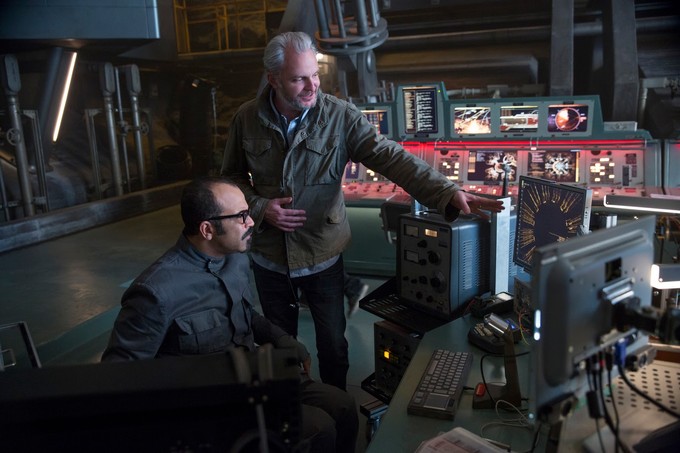
Quint: It's really interesting to me to see cinema embracing a more long form style. It used to be straight up sequels and you'd have five minutes at the beginning that are “this is what happened last movie in case you didn't see it!” Mockingjay counts on its audience having seen the last film to not get thrown for a loop by the first scene. It's more of a continuation like you'd see with long form storytelling on TV, which has been done in cinema before, like in the Lord of the Rings movies, but is still a fairly new concept.
Francis Lawrence: It's interesting because it's a little bit of a scary balance. We did it with Catching Fire in the same way. You definitely want to make a movie where somebody who hasn't seen the first two can come in, and they may need some acclimation time, but they'll sort of fall in line pretty quickly. You don't want to fill the beginning of your movie up with a bunch of exposition. You don't want to start with a “Previously On...” where you show flashbacks. You want to treat an audience as if they're smart, intelligent creatures who are there and pay attention and ready to lean in and go for a ride.
But there are definitely times where you get nervous and you try to make sure you're not coming at it in too obtrusive of a way. (If you haven't seen the previous films) you know who the players are, you know what the objectives are. The structure should be in play where you can go, “Okay, I understand what's happening and what Katniss wants.”
Quint: What do you think of the trend overall? Do you think it's a good move for the industry as a whole to embrace this new way of telling stories on the big screen? Do you see that as something the industry is going to move towards?
Francis Lawrence: I think so. When you take something like the Hunger Games series... okay, it has a beginning, it has an end. We're lucky because obviously the audience is huge and most people have read the books, but everybody should know there are certain chapters of the story and you're either picking it up in the second or third chapter. I think it works for things like that. There's an expectation when you're doing a Lord of the Rings or The Hobbit or a Harry Potter...
Quint: For a more novelistic approach to the movies.
Francis Lawrence: Exactly. I think it's different when you're not in a closed story like, let's say, a Transformers where you've got a movie that's widely popular and you're saying “Well, what can we do now?” and starting up a whole new thing. It's a different kind of storytelling. I think people go into these movies aware of it, so I think they're ready for a different kind of structural approach.
Quint: One of the things that sets Hunger Games apart from other sort of young adult material is that there's a countercultural edge to it. I mean, Mockingjay spends so much time telling us how propaganda works and how manufactured it is, even with the best of intension. That's really heady stuff for kids and teenagers. I think that's one of the reasons it's so popular...
Francis Lawrence: I do, too. Suzanne Collins set out to write a series of novels about war for teenagers, but I don't think she treated them like most people would treat teenagers. I don't think she held back and I don't think she shied away from some smarter and more thoughtful ideas. One of the things that's really exciting to me about it... I mean, to be able to make movies that will be seen by this many people that feel relevant to what's going on in the world now, that ideally can make kids think about some things... that's pretty exciting.
Quint: It's powerful. You can get that message through in popular entertainment. You can make a brilliant, Oscar winning documentary and you're most likely still only speaking to an audience that already agrees with you. It's powerful to be able to plant seeds like you do in this movie. I don't know if that's something you ever stopped and thought about while telling this story...
Francis Lawrence: I definitely did think about it. Ideally, and especially with the themes in this one, if it can help teenagers think about the kind of imagery that they're surrounded by all day long every day on their phones, on TV, in movies, if they can think about how that kind of imagery is manipulated for a certain effect, I think that's a great thing.
Quint: There's gray areas to everything. Katniss is torn in this film. She's definitely a reluctant hero and probably moreso than she has been since the first film. She's aware that if she becomes this figurehead and she calls people to action she's essentially saying, “Go die for me.”
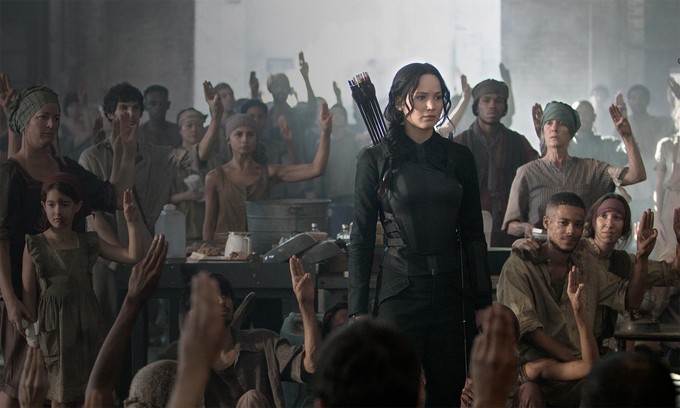
Francis Lawrence: Yeah! She feels responsible. She doesn't want the responsibility. I think it's one of the things that makes her a great character. You can relate! I mean, who wants the responsibility of a revolution entirely on their shoulders, even if they think it's just? That's a heavy load. I often call her the anti-super-hero because she's so human. Her judgment is very human.
Quint: You even have the moment when she's hunting and comes across the buck. That's pretty much the “Katniss in a nutshell” scene. They go to hunt, it's one of her favorite things to do, but when it feels like she has too much of an advantage...
Francis Lawrence: She can't do it.
Quint: I assume that most people who come to the movie, especially the younger fans, are coming purely for the entertainment of it, to see the people they like, to see the characters they like... but that's where the seeds always start. I can't tell you how many times I've gone back to childhood favorites and fully understood an idea or thread. In my case it was usually understanding some of the raunchy humor that flew over my head, but it's the same process.
Francis Lawrence: I was that way with visuals. I remember at a very young age watching A Clockwork Orange and being so struck by the visuals of it, but not really understanding the social ideas being presented that I didn't really get until my later years.
What's interesting is those kids you're talking about that are coming to see it because they like Jen or they like Katniss and Peeta's relationship... I think if we were to take out the themes and take out the ideas, I think even to that crowd it would start to feel very thin. I think it's part of what they like, even if they're not focusing on it.
Quint: These are also the people who will be rewatching it the most, so the subtext of the movie will be hammered into their brains. I know that's how I consumed the movies I loved growing up. I'd watch them repeatedly and I have to assume this generation will do that even more hardcore since they have such easy access to these movies and can watch them whenever they want, wherever they are.
Francis Lawrence: It's crazy. When I was my kid's age, I had a Betamax player and I had two tapes. I had Jaws and I had Donald Sutherland's Invasion of the Body Snatchers. I watched those every weekend. Now my kids have whatever movies they love on their iPad and they watch it over and over and over again.
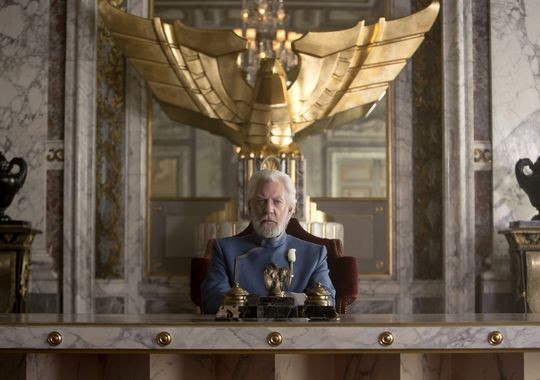
Quint: So was there ever a temptation during any of your Hunger Games work to go up to Donald Sutherland and direct him to point at the camera and make an O-face?
Francis Lawrence: No, but you know what... I didn't even tell him this, but there's a moment in Mockingjay Part II where he does something that reminds me of the end of Body Snatchers. I'm so excited! It's one of my favorite Donald moments in all of the Hunger Games movies. It's awesome. It really, really reminds me of that moment at the end of Body Snatchers.
Quint: I've got a fetish for character actors who did a lot of work in the '70s because that was kind of the decade of the character actor. They could be leads in films and not just John Wayne's drunk buddy. Needless to say, I'm a big fan of Donald Sutherland's work.
Francis Lawrence: When I first met with Donald before Catching Fire, and I don't remember why this came up, but he told me that after Ordinary People he couldn't get a job for two years. He couldn't get a meeting, couldn't get a job and he's still to this day stumped by it.
Quint: I just hosted a Q&A with Karen Allen and we got to talking about Animal House and the scene where she shows her ass and then he shows his. The way she told it, John Landis surprised her with the nudity. She had no idea her butt was going to be onscreen and she fought it. She said Sutherland took his pants off in solidarity, but they didn't realize his butt was going to pop out of the sweater until they actually shot the scene.
Francis Lawrence: It's funny. Donald was in GQ and I read the article and that scene was mentioned. He said he did to make the crew laugh.
Quint: Karen Allen remembers differently, but I'm sure the guy who showed his butt might know his motivations for doing so better than someone else. Since we're talking about the good actors you got to work with, I have to bring up Philip Seymour Hoffman. It's interesting to me how film companies and crews roll with a hit as sudden and tragic as his death, both emotionally and logistically. From the sounds of things you guys rolled with it as best as can be expected.
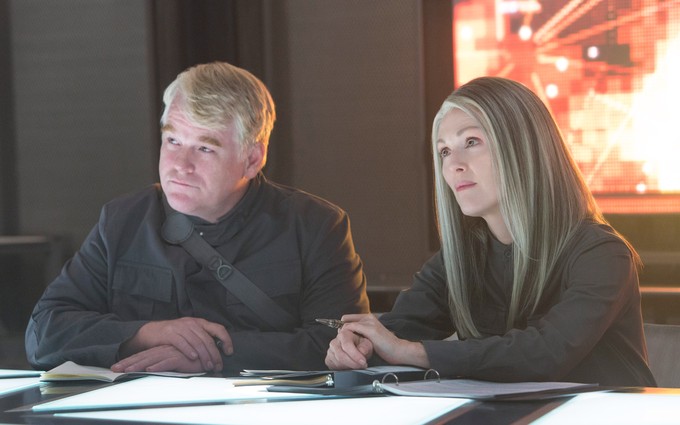
Francis Lawrence: Honestly, the emotional toll was much harder than the logistical toll because Phil was almost done. He had two substantial scenes left, one for each of the movies, with dialogue. He had a couple of other scenes he was in, but we have lots of scenes with a lot of the actors who don't speak and those were those scenes. I think he might have had 7 days left of shooting, of 55 or 56 days. He was almost done.
I know there were reports that we were going to do a CG version of Phil. We never, ever intended of doing a digital recreation of him giving a performance. Any time you see him in these movies we use real footage. The two scenes with dialogue we rewrote and gave to other actors. Elizabeth (Banks) took one scene in this... you've seen the movie, so there's the scene where Katniss is reunited with Effie in the cafeteria. That scene was originally going to be Effie and Plutarch. Plutarch was the one who gave Katniss the book and was the one saying “I miss coffee” and all of that. Effie just took that scene. Haymitch has a scene in Part 2 that was Phil's.
Emotionally it was really, really rough. It's obviously very strange to be hit with something like that, to lose a friend and a colleague, and then have to jump into logistical mode. It's a hard thing. You can't believe you have to make decisions like this while you're feeling these intense things.
Quint: It's weirdly personal because that's kind of what has to happen when a family member dies. You're hit with the emotion of it, but then all the logistics involved have to be addressed right away, like the funeral arrangements, etc. It sounds like it's a weird mirror of that with the film.
Francis Lawrence: It is. I guess in both circumstances it has to be done immediately, too. It's not something you can just sit around and wait on. We shut down for a little while, not a long while, but a little while, just to give everybody a beat. We reshuffled the shooting sequence so we could start really small. We started with scenes of just Jen and Liam alone. We were supposed to go into that cafeteria scene the Monday after and obviously we weren't going to do that. Also, we didn't want to be around a bunch of background and have a lot of chaos and all that, so we started really small, really quiet. We shot for a few half days and slowly started to introduce other cast members back into the mix.
It was interesting because everybody needed their ramp up time. Everybody that came back after it happened... Reuniting with the crew and being on set brings the memories up and everybody needed to talk about it and take their time. It took a good 6 weeks before it started to feel normal again. It takes a while.
Quite honestly, not until we moved to Europe did it really feel like there was some sort of new oxygen.
Quint: It's a new space.
Francis Lawrence: Exactly. It just feels different.
Quint: That's kind of a bummer note to end on, but my time's up. Thanks a lot for taking the time to talk with me.
Francis Lawrence: Thank you.
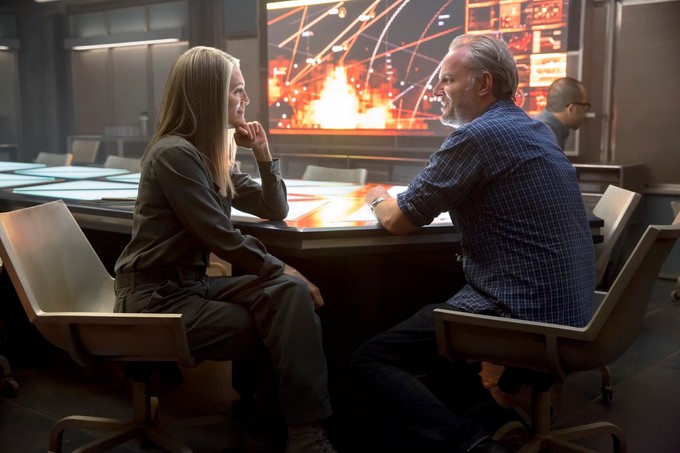
Hope you guys dug the chat. Now I'm diving back into Holiday Gift Guide land. Prepare your mind, body, soul and wallet, folks. Next week you're gonna see some cool shit.
-Eric Vespe
”Quint”
quint@aintitcool.com
Follow Me On Twitter

